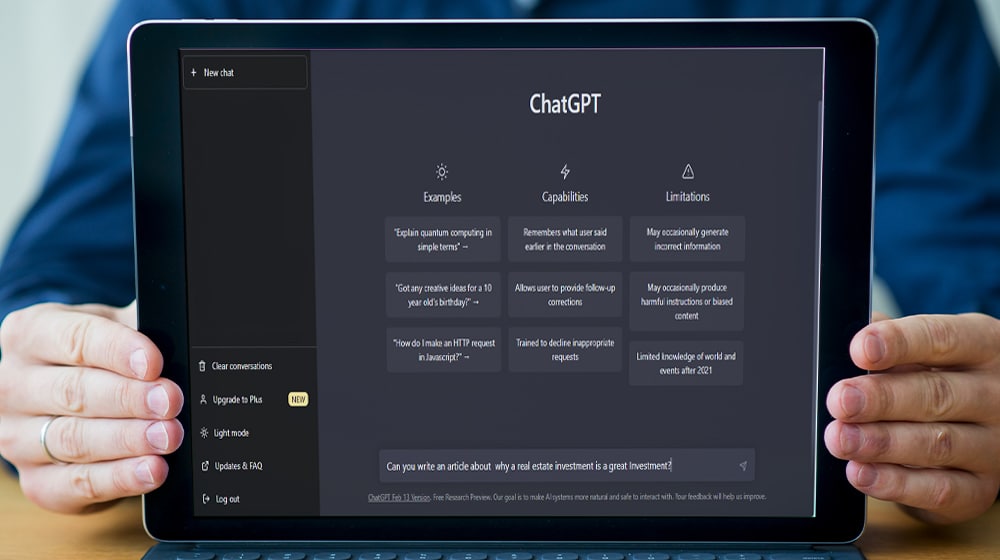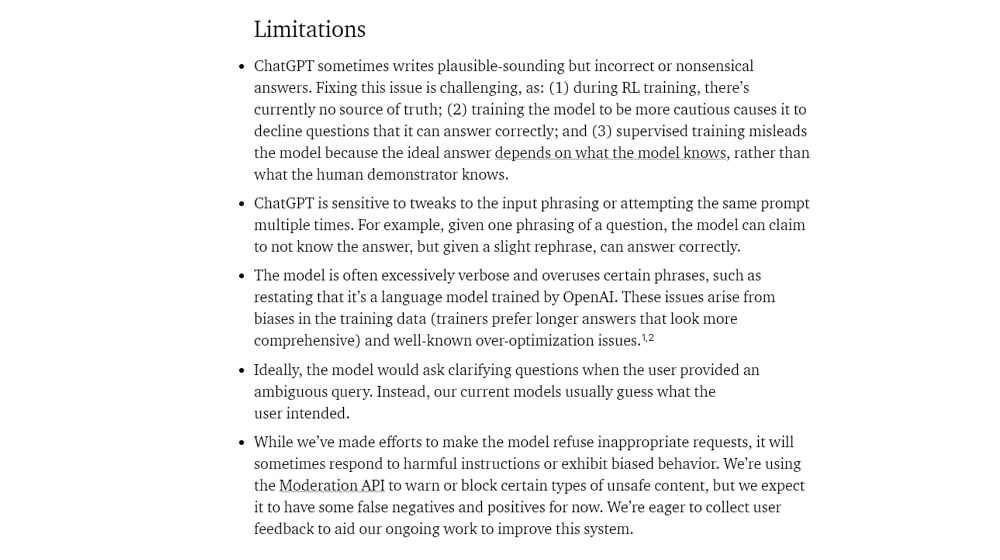AI is sweeping the world as a new tool that promises to revolutionize the way we create content. Traditional creators – writers, artists, and others – are worried, though some embrace the new as much as they can. One thing's for certain: the cat is out of the bag, and there's no putting it back.
 If you're a business and you want to use AI to generate your content, you would do well to hire an AI content writer to handle it for you.
If you're a business and you want to use AI to generate your content, you would do well to hire an AI content writer to handle it for you.But wait; if the AI is writing the content, what do you need an AI content writer for? Read on to find out.
The truth is, AI isn't perfect. In fact, it's a far cry from perfect. There are a lot of flaws with current AI systems, and while they produce content that is very impressive on the surface, that content has some serious drawbacks.
All of this comes from the core of what AI content generators are. AI content generators like Jasper and ChatGPT are nothing more than mathematical models. They have a vastly complex set of algorithms for learning how various words fit with one another, how phrases are put together, and how sentences are formed. They model, through a massive catalog of training data, what kinds of words and topics go with one another, so they can synthesize new content as a "remix" of what already exists.

In a way, you can think of it as one of those old-school article spinners on steroids. The AI isn't sapient, it can't think for itself, and it doesn't know anything that's not already in its training set. It can't come up with new and unique content or synthesize ideas on its own, and it can't draw logical conclusions because it doesn't operate on logic, just very advanced word association.
All of this means that current-generation content creation AI systems can't be left on their own. It's actually a pretty complex task to use the AI successfully, to generate something that doesn't suck, isn't contradictory, and isn't off-topic or irrelevant.
This is where the AI content writer comes in. Everything I just listed above is something that human input can solve with the right knowledge and practice. An AI content writer is a content producer who knows how to use the AI tools to great effect and, more importantly, knows the limits of the tools and where human effort is necessary to supplement them.
What does an AI content writer do?
AI can write very good-looking and good-sounding content, but that content doesn't necessarily go anywhere or mean anything. In many cases, the content it produces is basically just fluff, the exact kind of vapid, no-thought-required content that many readers (and Google) dislike. It's fine for things like basic landing pages, product descriptions, social media posts, and form letters, but for longer-form blog posts, it falls flat.

The AI content writer is akin to a developmental editor. They work with AI tools to generate an overarching outline for content, complete with a logical flow from idea to idea, a solid conclusion, and all of the supporting evidence.
None of this is all that different from what a high-level writer or a developmental/managing editor would do for you without AI. The difference is, they can produce their work faster by using the AI to generate the bulk content and basic filler information that would round out a post. They still need to develop their outline and come to the appropriate conclusions themselves and guide the AI tools into producing content that supports that framework.
As mentioned above, AI content generators do not have any sort of fact-checking inherent to them. They're very good at confidently stating anything. The AIs admit this, even; ChatGPT has this on their homepage:
"ChatGPT sometimes writes plausible-sounding but incorrect or nonsensical answers. Fixing this issue is challenging, as: (1) during RL training, there's currently no source of truth; (2) training the model to be more cautious causes it to decline questions that it can answer correctly; and (3) supervised training misleads the model because the ideal answer depends on what the model knows, rather than what the human demonstrator knows."
Current leading-edge AI systems are more concerned about conversational and realistic-sounding content, not factual content. Eventually, this problem may be solved – though it's challenging because of how these models work and how it's difficult to assign a value to the truth of a statement – but you can bet people are working on it.

Until such time as a factually-accurate AI comes out, we have to make do with the generators we have. That means an AI content writer isn't just a writer; they're a subject matter expert. They need to know enough about your subject – and enough about how to research and verify details – that they can review the content produced by an AI and validate the statements it makes.
Since AI can confidently state things that aren't true, there will come a time when businesses will be caught out in "lies" told by AIs. This has already happened to Google, and it cost them a billion dollars. A health or financial site could do even more damage to the people they reach. You don't want to be one of the brands that get hit, so your AI content writer needs to be a fact-checker.
Part of editing is polishing up content, whether it's simply copyediting, streamlining, or enhancing existing content. AI tends to be somewhat repetitive, especially when it's generating several discrete chunks of content about a similar topic. It can be prone to restating points and using similar structures for "intro" paragraphs to each section generated. This means a lot of the content an AI generates may look good in isolation but comes across as repetitive and clunky when taken as a larger whole.
An AI content writer will streamline and enhance this content. They can remove unnecessary words, phrases, and sentences. They can punch up and spice up sections of content to make them more attractive to readers. They can put more effort into making their content more engaging.

In the near future, you can bet that pushback against AI content generation is going to be fierce. It's unlikely that Google will completely ban it due to how difficult it is to detect, but they will certainly increase their content standards to try to undercut the most bland, uninteresting, and unedited AI content. The AI content that thrives will be content that is heavily edited and improved, such that it almost doesn't resemble AI content at all.
How is this different from hiring a writer to produce content entirely on their own? It's tricky to say. Many of the current AI content generation systems are finicky enough that it can take almost as long for a writer to write using the AI as it would writing on their own. Partly, though, that's because no one has enough familiarity with the AI yet to be truly fluent in it. Eventually, that will change. We'll see how it goes.
AI generates good-sounding conversational content, but is that all you want for your blog? Probably not.
Your content may not need to be conversational. Maybe you need more technical content, and the AI struggles to generate the right format and formality you need.

More likely, though, the biggest drawback is going to be SEO. The AI writes "naturally" about your topic, but it isn't going to pay attention to specific keywords, keyword usage, and keyword density. All of these are things that a good marketing writer knows intuitively and can inject into their writing. They're also things you can use other SEO tools, like Surfer to Clearscope, to help you with. In any case, the AI can't do it alone, so you need a writer who can guide it and improve the content it generates according to SEO best practices.
Disjointed content, content that needs editing, content that needs improvement; all of these are surmountable problems. In order to handle those problems, though, your AI content writer needs to know how to recognize those problems and how to fix them.

That means an AI content writer isn't an AI enthusiast looking to weaponize a tool for their own benefit. They aren't a developer looking to tell an AI to write content and publish it as-is. They aren't a business owner just uncritically publishing AI-created content.
No, they're writers first, using a new tool to help create content faster or in a more streamlined fashion. All of the stitching together, all of the logical editing, all of the fact-checking; this is all stuff your writer would be doing with or without an AI tool in play. AI content writers are writers first, editors second, and AI tool users third.
How can you find a good AI content writer? Well, it's tricky.
The biggest problem you're going to run into is that the AI tools have only existed for a comparatively short amount of time. There are very few people who are truly experts in using these tools, and many of the true experts are using the tools for their own ends while the getting is still good.
At the same time, there are a lot of people whose jobs were already the bare minimum and whose livelihoods are threatened by AI; they're the ones most likely to be taking up the AI tools to replace their own skills, but they're also the least likely to have the SEO, marketing, editing, and subject matter expertise necessary to be truly excellent AI content writers.
As with many content creation jobs, though, it all comes down to examples. If you want to hire an AI content writer, give them a writing assignment just like you would for a standard content writer. See how well they can meet your needs using the AI tools available. Check their content for factual accuracy, logical flow, keyword usage, and adherence to style.
Once you find a writer capable of performing all of the tasks you need using AI content creation tools, it's just a matter of negotiating prices, signing contracts, and generally handling all of the minutiae of any freelance hiring.

One thing is certain; if you're looking to hire a writer of any sort, AI or not, you should check out my job board. You can also use that job board to hire editors of all sorts and experts in various niches to help you build a top-notch content creation team.
If you're an AI content writer and you're looking for work, feel free to browse the job board as well. Plenty of businesses are going to be dipping their toes into AI content generation, and while some proportion of them are bound to be burned by it, you can help others avoid the pitfalls with your skills. Just browse the available jobs and pitch your services.
Have any questions? Feel free to drop me a line. I'm always interested in chatting about the cutting edge of writing, editing, and content creation, and that includes the debates about AI. I look forward to seeing your job posts and hearing from you!